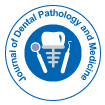Notre groupe organise plus de 3 000 séries de conférences Événements chaque année aux États-Unis, en Europe et en Europe. Asie avec le soutien de 1 000 autres Sociétés scientifiques et publie plus de 700 Open Access Revues qui contiennent plus de 50 000 personnalités éminentes, des scientifiques réputés en tant que membres du comité de rédaction.
Les revues en libre accès gagnent plus de lecteurs et de citations
700 revues et 15 000 000 de lecteurs Chaque revue attire plus de 25 000 lecteurs
Indexé dans
- Google Scholar
- ICMJE
Liens utiles
Revues en libre accès
Partager cette page
Abstrait
Dental clearance prior to medical intervention in patients with liver failure
Jeffery Lynn Hicks
As many as one in 10 Americans have some form of liver disease. Cirrhosis and chronic liver failure are leading causes of morbidity and mortality, with most cases due to excessive alcohol intake, viral hepatitis, or nonalcoholic fatty liver disease. Routine liver function tests do not correlate well with degree of liver function but with liver cell damage instead. Liver transplant is the only effective long-term treatment for chronic liver failure. The study detailed in this paper was undertaken to determine: 1. the oral disease presence in patients with liver failure awaiting liver transplant; 2. the oral health care determined to be necessary to clear patients for transplant and the costs of that oral care; 3. the effectiveness of an examination and treatment algorithm in the evaluation and care of liver failure patients; and 4. whether correlations existed among various commonly performed laboratory tests in these patients. The study showed that patients awaiting liver transplant commonly have generalized severe periodontal disease and periapical abscesses which would preclude the patient from undergoing transplant surgery. The average cost of care to issue dental clearance for the patients in this study was $1,169. Liver failure patients being considered for liver transplant surgery can be treated safely using a treatment algorithm to guide care that incorporates a few precautions to avoid post-operative bleeding. Precautions include platelet transfusion and use of agents and surgical technique to ensure hemostasis. Results of commonly used laboratory tests for liver failure patients were not found to show correlations with one another and were not considered good predictors of the risk for complications following invasive procedures.
Revues par sujet
- Agriculture et Aquaculture
- Biochimie
- Chimie
- Food & Nutrition
- Génétique et biologie moléculaire
- Géologie et sciences de la Terre
- Immunologie et microbiologie
- Ingénierie
- La science des matériaux
- Le physique
- Science générale
- Sciences cliniques
- Sciences environnementales
- Sciences médicales
- Sciences pharmaceutiques
- Sciences sociales et politiques
- Sciences vétérinaires
- Soins infirmiers et soins de santé
Revues cliniques et médicales
- Allaitement
- Anesthésiologie
- Biologie moléculaire
- Cardiologie
- Chirurgie
- Dentisterie
- Dermatologie
- Diabète et endocrinologie
- Gastro-entérologie
- Immunologie
- La génétique
- Maladies infectieuses
- Médecine
- Microbiologie
- Neurologie
- Oncologie
- Ophtalmologie
- Pédiatrie
- Recherche clinique
- Soins de santé
- Toxicologie

 English
English  Spanish
Spanish  Chinese
Chinese  Russian
Russian  German
German  Japanese
Japanese  Portuguese
Portuguese  Hindi
Hindi